Arctic temperatures blanket Russia
Arctic temperatures gripped most of Russia for a fourth day Thursday, pushing the death toll across the &to=http://english.pravda.ru/science/19/94/379/11966_plastination.html' target=_blank>frozen country to more than 30 people and even hardy Russians struggled to cope with the big freeze.
&to=http://english.pravda.ru/economics/2002/11/26/39978.html' target=_blank>Electricity use surged to record levels and towns and cities struggled to keep indoor temperatures up as temperatures in Moscow plunged overnight to as low as minus-31 Celsius (minus-24 Fahrenheit).
Seven people died of exposure in the Russian capital over the previous 24 hours, city emergency officials said, pushing the nationwide death toll from the Siberian cold wave that swept into Moscow late Monday to at least 31.
At a zoo in Lipetsk, south of Moscow, director Alexander Osipov said monkeys would be given wine three times day, "to protect against colds," the RIA-Novosti news agency reported.
Schoolchildren stayed home and drivers struggled to start cars but thousands of religious believers _ along with other hardy souls _ plunged into icy waters nationwide for an annual ritual marking the Russian Orthodox Christian holiday of Epiphany.
The temperature was the lowest recorded on Jan. 19 since 1927, said Tatyana Pozdnyakova, a Moscow weather forecasting service official. This year is the coldest since the winter of 1978-1979, when temperatures reached minus-38 Celsius (-36.4 Fahrenheit).
Vendors at Moscow's outdoor food and clothing markets shuttered their booths and outdoor ATMs reportedly froze up, while traffic was uncharacteristically light as drivers were reluctant to venture out or unable to start their cars. Outside one apartment building, residents hefted car batteries back into their vehicles after taking them home overnight to keep them warm. Others tried to jump-start their cars.
Many parents kept their children home from school. At least two towns in the Moscow region saw heat disrupted by water main breaks, leaving dozens of homes and thousands of people shivering. A similar accident left thousands without heat in Siberia's Chita region, some 4,700 kilometers (3,000 miles) east of Moscow. Russian buildings frequently are heated by municipal hot water systems.
Subscribe to Pravda.Ru Telegram channel, Facebook, RSS!




